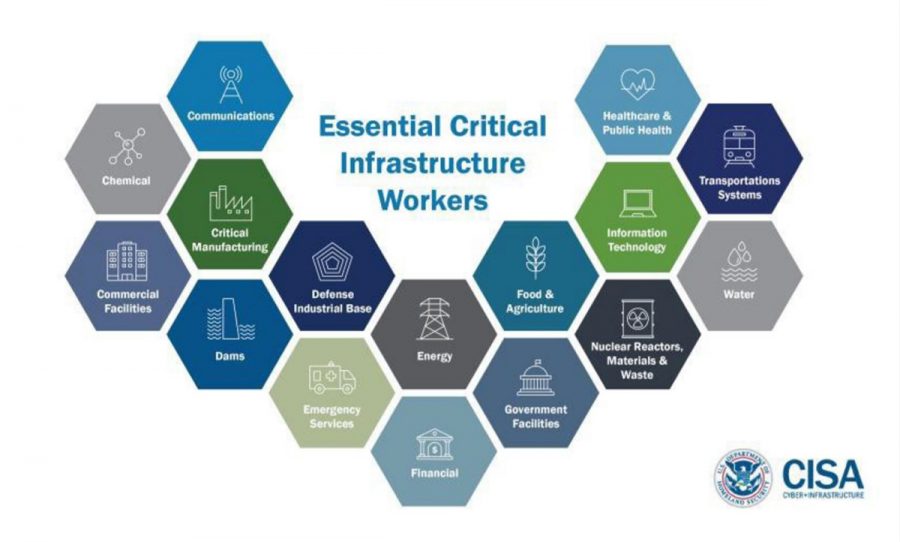In the eyes of essential workers
During the COVID-19 pandemic, many businesses labeled as essential are required to remain open
Photo by Submitted
Amidst the COVID-19 pandemic, many people are still required to work at essential businesses.
The pandemic caused by COVID-19 has called for millions of people to stay in their homes, but a select few remain in the public’s eye: essential workers.
Essential workers are defined as people who protect their communities, while ensuring continuity of functions critical to public health and safety, as well as economic and national security, according to The Brookings Press.
Naomi Hionis, a second-year Spanish for health professions student, is an emergency medical technician basic for Evansville, Wis.
Being an EMT, Hionis said her chief has established many changes to their protocol in order to improve the safety of the EMS crew and patients alike.
She said they are now required to wear an N-95 mask, used to protect against airborne particles, goggles or eye glasses, a surgical gown and double gloves for every call — regardless of the nature of that call.
Hionis said she has seen a significant decrease in the volume of calls they would normally receive. She said they went a span of five days with no pages, which is rare.
Despite this hard time, Hionis said she feels her and her coworkers have gained a stronger sense of community and family. She said the pandemic has been a major adjustment to her social and professional life.
“Many of us also work full/part-time at surrounding hospitals, which adds a lot to the EMS job during this time,” Hionis said. “It has allowed us to fall back on each other more for support.”
Brooklyn Mason, a second-year biology student, is a grocery clerk at Woodman’s in Altoona, Wis., as well as a Math Lab tutor for students at UW-Eau Claire.
Mason said the lines in the store would have a wait time of over four hours a month ago. Now, things have started to calm down.
During the last several weeks, Woodman’s employees have been supplied with masks and gloves. Masks have become a requirement for employees. The store also put up shields at each register and changed how they organize the checkout lines, she said.
“Work, for me here, hasn’t been too crazy,” Mason said. “I actually miss the crazy rush and never ending lines.”
As a Math Lab tutor, Mason said not much has changed, aside from the program’s transition to online-only. She said there were three to four mini workshops on how to navigate Collaborate Ultra and how to perform different actions, like moving someone to a different room or screen sharing.
As a Kwik Trip employee, Morgan Mlsna, a fourth-year finance student, said Kwik Trip is providing employees a $2 wage increase from mid-March to the third week in April. She said corporate understands that Kwik Trip has to stay open while employees risk their health to be at work.
Mlsna said Kwik Trip just distributed cloth masks to workers if they choose to wear them. She said stores have shut down self-serve services, like coffee and soda, and employees must now serve the customers themselves to reduce contamination.
Kwik Trip recently put limits on how many people can be in the store at once, including employees, Mlsna said.
“Most of the people that tell us to stay safe are the ones that should be home,” Mlsna said.
Nick Spiess, a third-year human-computer interaction student, works in System Management and Configuration at UW-Eau Claire — which requires a lot of software packaging for apps on campus systems, he said.
“I’ve been given a laptop to work remotely at home so I’m able to still get my hours,” Spiess said. “And my bosses have been super understanding and really great.”
Spiess said his main boss emailed a lot of the students, letting them know they can reach out if they need help with food and necessities, as he considered the stimulus package may not have provided much for students.
The work itself though makes it difficult to stay in the same place for an extended period of time and build a structure around that, Spiess said.
There are many things to do to thank an essential worker without leaving home, according to an article by Real Simple. A few suggestions the article highlighted are:
- Create a sign. This way one could show their gratitude through the front window of a business or hospital.
- Donate personal protective equipment such as gloves and masks. A lot of essential workers are in need of such equipment, but may not have access to it.
- Reach out to family or friends who are essential workers. They may be working long hours, but would most likely appreciate knowing someone is there for them.
- Show kindness. A simple smile can go a long way.
- Stay home. Staying home is the best thing people can do to slow the spread of the virus and keep essential workers safe.
Dirks can be reached at dirksmk5617@uwec.edu.

McKenna Dirks is a fourth-year journalism student and this is her seventh semester on The Spectator staff. She thrives under chaotic environments, loves plants and often gives off "granola girl" vibes with her Blundstone boots.

